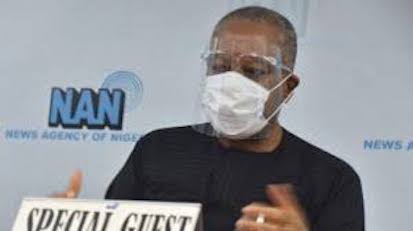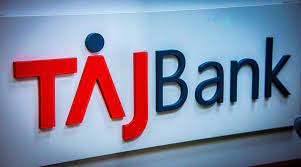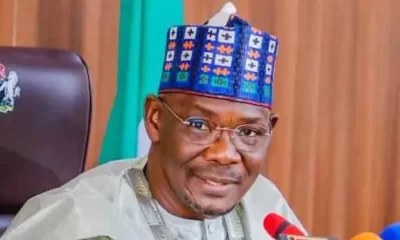Foreign News
How I Survived COVID-19 — Onyema

The Minister of Foreign Affairs, Mr Geoffery Onyeama, has described how he contracted and survived the COVID-19 infection for three weeks.
Onyeama spoke on Thursday in Abuja at the joint national briefing of the Presidential Task Force (PTF) on COVID-19.
The News Agency of Nigeria(NAN) reports that the minister, who was confirmed positive on July 19 after his fourth COVID-19 test, joined the list of governors and other prominent Nigerians who have contracted the virus.
While some died of the complications of the virus, some survived to tell their stories.
He said: “I have to say that one of the things I was thinking about is that the PTF is like a military high command.
It occurred to me that none have been tested positive.“Maybe it was a good thing that a member of the team can now speak from experience and not just from hearing. COVID-19 is real. I used to have a three layers of protection but it did not stop that.
“I will like to say that the issue of stigmatisation is nothing to be ashamed of. Anybody can get this virus and it is nothing to fear. It is not a death sentence.
“In my case, the moment I felt something different on a Friday, I was tested the following day but we don’t have the capacity.
“I was discussing with the Minister of Health that if people cannot be tested sooner enough, they can recommend some medication. Don’t feel it is anything shameful. Just treat it like any other sickness.”
The minister added: “I will like to use the opportunity to thank the medical crew in the isolation I was staying and very proud that they are Nigerians.
“We can be negative on ourselves but for the three weeks in isolation, I cannot speak more highly of our medical crew. The most agreeable. I could even go back there for weekends. I really congratulate them for the work they did.”(NAN)
Foreign News
Nightclub Fire in India’s Goa Kills 25 People

A fire at a popular nightclub in India’s coastal region of Goa has killed 25 people, local officials say.
Police believe a gas cylinder exploded in the kitchen of the Birch nightclub, located near a popular beach. The venue was packed with revellers who had come to hear a Bollywood DJ.
Four people from the same Delhi family and 21 staff were among the victims, Goa police said, adding that most had died of suffocation.
The nightclub’s manager has been arrested and an arrest warrant for the owner has been issued.
Goa is a former Portuguese colony on the Arabian Sea. Its nightlife, sandy beaches, and resorts attract millions of tourists annually.
Eyewitnesses said of scenes of panic in the bustling nightlife area.
One eyewitness said that it was a usual Saturday night and holidaymakers were enjoying themselves.
He said: “I was outside the club when I heard screams, I didn’t initially understand what was going on.
“In a bit, it became clear that a massive fire had broken out. The scenes were just horrific.”
Though the main entrance is wide, the crossing on the small lake leading to the main structure is narrow and that made it difficult for firefighters to reach the spot.
Local police chief Alok Kumar said the fire had been concentrated in the kitchen area on the ground floor.
Goa’s Chief Minister Pramod Sawant told journalists three people had died from burn injuries, while others died of suffocation.
Six people are in a stable condition in hospital.
A chef who works at a nearby venue said he knew some of the workers at the Birch club.
“People from all over the country and also from Nepal work in different clubs in Goa,” he said.
“I am really worried for some people who I knew at the club. Their phones are off.”
On Sunday emergency teams were combing through the charred wreckage.
An inquiry into the cause of the fire has been launched, the chief minister said.
“Those found responsible will face most stringent action under the law – any negligence will be dealt with firmly,” Dr Sawant said.
Prime Minister Narendra Modi called the Goa fire “deeply saddening” in a post on social media.
About 5.5 million tourists visited Goa in the first half of the year, government data showed, with 270,000 coming from abroad.
Some opposition politicians said that stricter regulations were needed to avoid such tragedies.
They alleged that newer clubs are opening too frequently and the government needs to ensure they are safe for people to visit.
India has seen a number of deadly fires at entertainment venues in recent years.
A fire at a three-storey building killed 17 in the southern city of Hyderabad in May, while a hotel blaze in north-east Kolkata left 15 dead a month earlier.
Last year, 24 died at an amusement park arcade in the western state of Gujarat after visitors were trapped inside. An official review later found poor safety standards contributed to the death toll.
| ReplyReply allForwardAdd reaction |
Foreign News
Hong Kong votes in Election as City Mourns Deadly Fire

Hongkongers are voting in an election seen as a test of public sentiment following a deadly fire that angered some in the city.
The government has mounted a huge campaign to encourage Hongkongers to choose members of the Legislative Council (LegCo). All of the candidates have been vetted to ensure they are loyal to China.
The election takes place as many are mourning the Tai Po fire last month which killed nearly 160 people.
In recent days, authorities have distributed aid to survivors, arrested suspects and sought to improve building safety, as some Hongkongers raise questions about the incident.
A total of 161 candidates are competing for 90 seats in the LegCo, which acts as a mini parliament and can make and amend laws.
The election is the second since 2021 when China made sweeping changes to Hong Kong’s electoral system to ensure only “patriots” could run for seats.
Beijing has said the changes, which were put in place shortly after the 2019 protests, were necessary to ensure stability in Hong Kong, but critics say they weakened democracy.
The last poll, which took place shortly after those changes, saw its lowest-ever turnout of 30% amid widespread voter apathy.
This year, the government has blanketed the city with posters urging Hongkongers to head to the polls, while dangling freebies and shopping discounts.
After casting their vote, each person will receive a “thank you card” that could be redeemed for vouchers in selected shops and restaurants, or for beauty services, medical check-ups and insurance policy premiums.
Authorities are also offering free entry to public swimming pools and museums on the polling day, organising carnivals in various neighbourhoods, and holding a televised variety show and gala.
They have also created cartoon mascots and a theme tune for the election, adapted from a 2001 hit song by Cantopop star Aaron Kwok, called “Let’s Vote, Together We Create The Future”.
Chief Secretary Eric Chan told reporters last month that the measures were aimed at ensuring “a happy and festive mood” and to “let residents recognise the importance of the election”.
But in recent days the city has been focusing on the 26 November fire that engulfed high-rise residential blocks at Wang Fuk Court in the northern district of Tai Po.
The blaze was the worst seen in Hong Kong in more than 70 years. The death toll, which currently stands at 159, is likely to rise further as officials continue to recover bodies.
As Hong Kong mourns its dead, some are asking whether the fire could have been prevented and questioning building safety standards. Many Hongkongers live in ageing high-rise buildings similar to Wang Fuk Court.
Authorities have since ordered the creation of an independent committee to investigate the cause of the fire, and have arrested 13 people for suspected manslaughter.
They have also ordered the removal of scaffolding mesh used in all building renovations across the city. Investigators have found that a scaffolding mesh used for renovations in Wang Fuk Court failed to meet flame retardant standards, and that the fire spread quickly due to the mesh and other flammable materials on the outside of the buildings.
Authorities have also moved quickly to quell dissent. Police have reportedly detained a man, who was part of a group petitioning for an independent inquiry, for suspected sedition on Saturday. The petition was also wiped from the Internet.
Two other people, including a former district councillor, were also taken in by police.
Political campaigning for the LegCo election was immediately suspended following the fire, though government-organised debate forums resumed after a few days. Carnivals organised for the election campaign have also been cancelled.
Hong Kong chief executive John Lee has insisted the LegCo election continue as planned as “we must move forward before we can turn our grief into strength”.
He said that the new legislators would be able to quickly support reconstruction and reforms.
John P Burns, emeritus professor and Chinese politics expert with the University of Hong Kong, said he believed the government would interpret a high turnout as a sign that voters perceive Hong Kong’s reshaped political system as “Relatively legitimate”.
But he expected the numbers to be low, in part due to the Tai Po fire.
He pointed out that most Hongkongers have traditionally supported the pan-democrat opposition – which have been effectively barred from taking part. “I think they won’t be convinced to participate this time, just as they mostly stayed away in 2021,” he said.
Mobilising the pro-establishment voters following the fire would be difficult for the government as well, he added.
Some in that camp will be impressed by how authorities have speedily re-housed those made homeless in the fire and the aid authorities have provided, “which by any measure has been rapid and relatively generous”, noted Prof Burns.
Hong Kong’s national security office this week reposted a commentary from a pro-Beijing news outlet that urged residents to vote to show support for government’s reconstruction efforts.
This year’s LegCo election will feature a number of new faces with about a quarter of the incumbent lawmakers stepping down.
Local media have reported that Beijing pressured several lawmakers to retire as they have unofficially set an age limit.
A number of those stepping down are aged above 70, including the prominent politician Regina Ip, a former security chief nicknamed the “Iron Lady”.
Foreign News
Tinubu Reaffirms Commitment to Protect Nigerian Children

By Ubong Ukpong, Abuja
President Bola Tinubu has expressed commitment to the development of children in the country.
He said this at the launching and public presentation of a new book titled The Power of a Teenager: 50 Ways to Inspire Change, written by Chairman of the Public Accounts Committee, House of Representatives, and Founder of the Children of Africa Leadership and Values Development Initiative (CALDEV), Rep.
Bamidele Salam on Thursday.Tinubu, who was represented by the Senior Special Assistant to the National Assembly, House of Representatives Liaison, Dr. Ibrahim Olarewaju, commended Salam for his dedication to youth development.
“You may not fully understand the impact of what you are receiving now, but tomorrow you will see what.
Hon. Bamidele Salam has done in your lives,” he said.He urged all attendees to make a personal commitment to shaping the minds of young Nigerians, stressing that while Salam funded the initiative personally, the greater task lies in mentoring and guiding the nation’s youth.
The Vice President, Kashim Shettima, described the launch as a clear demonstration of the potential of Nigerian children.
Represented by Senior Special Assistant, Dr. Kingsley Uzoma, praised Salam for aligning his work with the administration’s vision for youth empowerment.
“This initiative speaks directly to the leaders of tomorrow,” he added, commending both the organisation and the children participating in the programme.
Chief of Staff to the President, Femi Gbajabiamila also lauded Salam’s efforts.
“Nigerian children are the future of this nation. Even though they are young, we are looking to them to take this country to where it should be,” he said.
Gbajabiamila commended Salam for consistently producing the book annually, calling it a testament to leadership and commitment.
“Leadership may be inborn or thrust upon you, but there must be someone to guide you. That is what this book is doing—it provides the guidance our young people need,” he said, urging children to read and internalise its lessons.
Speaking at the event, Rep. Bamidele Salam shared the story of how CALDEV was founded in 2015 to fill a gap in Nigeria’s educational system.
Unlike in other countries, he said, leadership training is rarely embedded in the curriculum. Through CALDEV and its flagship National Children’s Leadership Conference, children gain practical exposure to leadership, public speaking, and community service.
Many past participants have gone on to start NGOs, run radio programmes, and lead campaigns addressing early marriage, child labour, and other social issues.
“This year, about 400 children are participating, and the impact has been phenomenal,” Salam said. He urged state governments to replicate the initiative at the state level to provide young people across Nigeria with intensive leadership training. Highlighting the large participation from Borno State, Salam said that properly trained and nurtured children could become agents of change, promoting peace, tolerance, education, and societal development.
Minority Leader of the House of Representatives, Kingsley Chinda, lauded Rep. Bamidele Salam for his dedication to youth development through the newly launched book.
Chinda expressed pride that a member of the House is actively shaping the future of Nigerian children.
“As members of the House of Representatives, we hold our heads high today that one of us is doing this. We are very, very proud, and we pray that this inspiration should flow through every other member of the House,” he said.
Chinda noted that the legacy of leaders and thinkers is remembered not for wealth but for wisdom and the knowledge they left behind.
“When we see initiatives like this, these are the things worthy of celebration,” he said.
Member of the House from Borno State, Zainab Gimba, said,”We have come because we are celebrating not just a book today when they had an imagination behind it. I actually commend for shining the compassionate and bright lights of our teenagers.
“He has given our young people a voice that others will also step on the same foot, so that our teenagers will be empowered, not in this generation, but in future generations to come.”






























